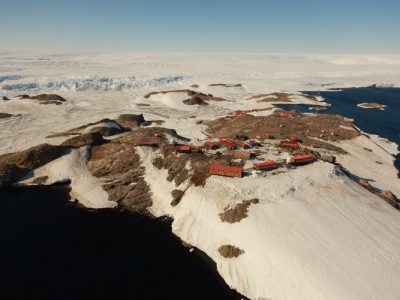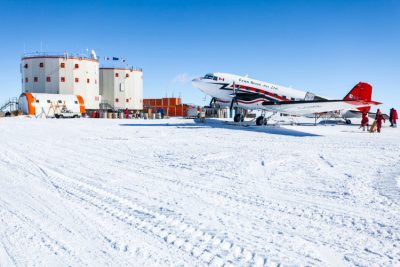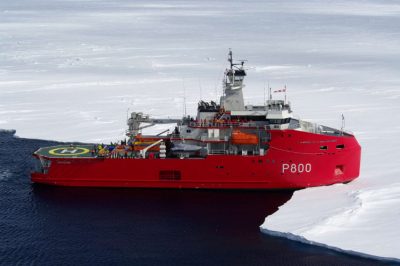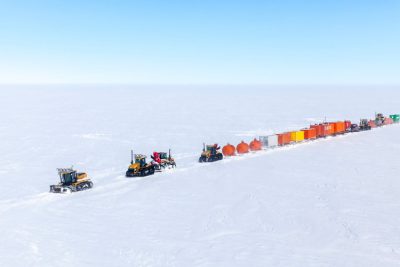| Focus
1/1 | The Antarctic Treaty: a unique governance for the environment and science
Figure 1. The French station Dumont d’Urville, in Terre Adélie. The French Polar Institute Paul-Emile Victor (IPEV) organizes scientific research there and, by delegation from the French Southern and Antarctic Territories, ensures its logistics and maintenance. [Source: © Infrapol – IPEV] France has two research stations in Antarctica: the
Dumont d’Urville station , in the coastal zone of the Adelie Earth (Figure 1), and the
Concordia station , on the Antarctic high plateau (Figure 2). The
Institut Polaire Française Paul-Emile Victor (IPEV) is the national resources agency that manages these two stations in partnership, in the case of Concordia, with the
Programma Nazionale di Ricerche in Antartide (PNRA), since this station is Franco-Italian.
The IPEV, created in 1992, is a Public Interest Group, based in Brest, and composed of 9 members: the Ministry of Higher Education, Research and Innovation, the Ministry of Europe and Foreign Affairs, the CNRS, Ifremer, the CEA, the CNES, Météo-France, the French Southern and Antarctic Lands (TAAF) and the French Polar Expeditions (EPF). Its main purpose is to select, coordinate, support and implement national and international science and technology programmes in the polar, northern and southern regions.
Figure 2. The Concordia Franco-Italian resort, which has been open continuously throughout the year since 2015. It is jointly managed by the ENPI and the NARP. Only 2 other permanent stations are active in the interior of the continent: Scott-Amundsen (USA) and Vostok (Russia). All other Antarctic research stations are located on the coast and in the Antarctic Peninsula. [Source: © Thibaut Vergoz – IPEV] In this context, the IPEV supports annually about 80 projects in both the Arctic and Antarctic on various themes such as :
The distribution of fauna and flora and the evolution of biodiversity
Survival strategies and adaptation of species to extreme conditions
The response of living organisms to climate change and human activities
Earth physics, geodynamics and geology
Atmospheric chemistry and dynamics, including ozone chemistry
Glaciology and paleoclimatology
Astronomy
Human biology and adaptation to wintering conditions in Antarctica.
Figure 3. The Astrolabe, an icebreaker ship (IB5) owned by the TAAF, equipped by the French Navy, and operated by the IPEV during the southern summer for the maritime service to Terre Adélie, in order to supply the Dumont d’Urville and Concordia bases. This ship left the Piriou shipyards in Concarneau in July 2017 and carried out its first missions in Antarctica in November of the same year. [Source: © Patrice Bretel – IPEV] To supply the two stations Dumont d’Urville and Concordia, the IPEV operates, in partnership with the TAAF and the French Navy, a new icebreaker, the Astrolabe (Figure 3), which made its first trips to Antarctica in late 2017, from the port of Hobart, Tasmania (Australia). Then, between Dumont d’Urville and Concordia, equipment, fuel and food are transported by land, using convoys on ice (Figure 4), the result of the development and know-how of the IPEV, which has become the leader in this type of movement.
These heavy infrastructures (stations, ships, land convoys, planes, helicopters) are naturally expensive but are essential to enable France to participate in the international research effort in Antarctica and to maintain its position among the countries that contribute most widely to it. Thus, France ranks 5th among countries publishing on Antarctica; in Europe, only Germany and the United Kingdom are ahead.
Figure 4. Land convoy linking Robert Guillard station, an annex of Dumont d’Urville station in Terre Adélie, to Cap Prudhomme, and Concordia station, 1100 km apart. All of Concordia’s supplies, fuel, food, building materials, scientific equipment, are provided in this way, through 2 to 3 trips during each austral summer. The staff are transported by plane. [Source: © Thibaut Vergoz – IPEV] This French scientific excellence in Antarctica is naturally due to the researchers involved, coming from various research organizations, primarily the CNRS, but also to the existence of quality research infrastructures in Antarctica, and to the presence of the IPEV resources agency that maintains, manages and offers access to them to the scientific community.
It is in particular thanks to its scientific presence that France can now play a leading role in the unique governance of the Antarctic Treaty System.








